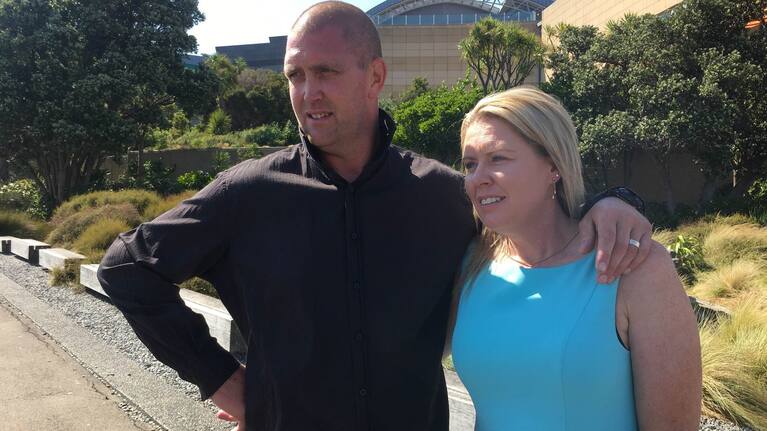A Southland cancer patient who has three months left to live says the Government needs to work faster to put a national cancer treatment strategy in place.
After renewing his wedding vows, fundraising to get Central Southland College’s 1st XV rugby team to Australia for a pre-season training trip and playing a game of rugby (with several All Blacks in attendance), Blair Vining's final bucket list item is to leave the country with a nationally-managed cancer treatment plan.
"It needs to start today, it’s not tomorrow, it’s not in six months’ time - we need this to happen today," the father-of-two told 1 NEWS.
Mr Vining, who has bowel, liver, stomach, lung, and lymphatic cancer, shared his experience of the "dysfunctional" public health system at the largest cancer conference of its kind the country’s ever held, Cancer Care at a Crossroads, in Wellington.

Mr Vining was diagnosed with cancer in late October last year, being told he had six to eight weeks to live.
He was told it would take that long to get an appointment with an oncologist at Southland Hospital, so he used health insurance to get treatment privately.
"If I relied on the public system I wouldn’t be here today," he said.
Melissa Vining, Blair's wife, said as taxpaying citizens they had complete trust in the public health system before he was diagnosed.
"It’s traumatic when you get a diagnosis like that, let alone then being disappointed to hear that the Government does not have a clear strategic plan to deal with the country's biggest killer," she said.
Mrs Vining told Health Minister David Clark during the couple’s conference speech that he had let her husband, herself and her daughters down.
When Mr Vining found himself suddenly at risk of his bowel obstructing, it took 13 hours for Southland Hospital to decide for him to be flown to Christchurch Hospital for emergency surgery with a specialist.
Private treatment has now reduced his cancer by 50 per cent, he said, giving him a further three months to live.
The Ministry of Health’s new strategy for cancer services was announced at today’s conference, with workshops on what the plan should look like to be held this Saturday.
In a statement, Ministry of Health director general Ashley Bloomfield said the strategy will be driven by a goal to make treatment of the same standard for all New Zealanders.
"It aims to ensure nationally consistent health outcomes, putting stronger emphasis on prevention, early diagnosis and improved standards of care," he said.
The plan is being developed in the medium to long-term, with an expectation that a draft of the plan will be shown to Health Minister David Clark in June.
Mr Clark said stronger central leadership is required, which the Ministry of Health hasn't consistently achieved.
"I want to see a new cancer action plan developed focused on lifting performance nationwide and tackling inequalities in outcomes, particularly for Māori and other disadvantaged groups," Mr Clark said in a statement.
Cancer Society medical director and oncologist Dr Chris Jackson disagreed that cancer treatment was a priority for the Government, saying more investment and action is needed.
"In the Minister’s letter of expectations to DHB’s last year, which is one of the instruments they use, cancer wasn’t mentioned so it’s clearly not a major priority for this Government and we think that needs to change," he said.
Mr Jackson said with an ageing population that is also growing, New Zealand’s biggest killer would increase in numbers.
"In Australia, you've got a state-based cancer agency, and you've got a national cancer agency, in Canada you’ve got a national cancer agency, in New Zealand, we've got 20 DHB's doing their own thing."
He said not all district health boards are investing in the latest technology and some aren’t staffed sufficiently, as without central planning, organisations aren’t aware of future demand leading to some people missing out.
"It's heart-breaking and every single time I see a patient, I see gaps in the system - it absolutely breaks your heart."
Dr Jackson said while the death rate has decreased in New Zealand, outcomes in Canada and Australia have surged ahead.
Cancer is responsible for 30 per cent of all deaths in New Zealand and Māori have nearly two times the death rate of non-Māori.
"Cancer is unevenly experienced in New Zealand, with Māori, Pacific people and those living rurally having poorer outcomes," the Ministry of Health states on its website.


















SHARE ME